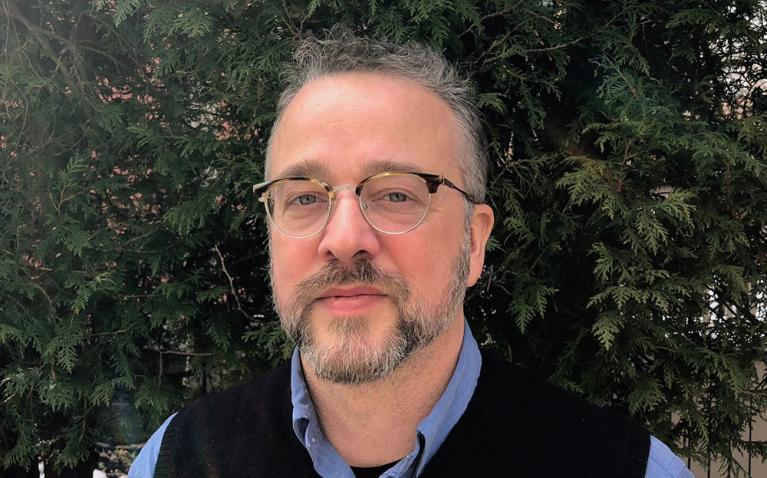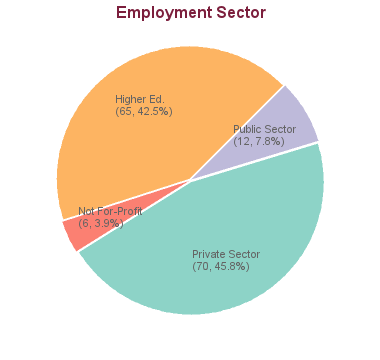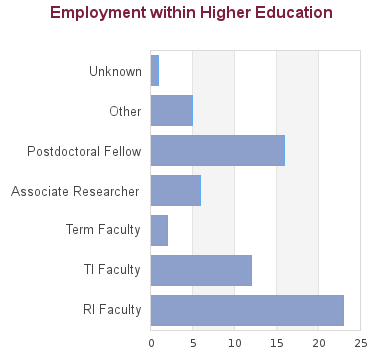
Peter Caravan
Job Title
Co-Director, Institute for Innovation in Imaging and Associate Professor of Radiology
Employer
Massachusetts General Hospital and Harvard Medical School

Review details about the recently announced changes to study and work permits that apply to master’s and doctoral degree students. Read more
In the Chemistry department Faculty, graduate students, postdoctoral fellows, undergraduates and staff members work cooperatively in a collegial environment to tackle some of the world's most pressing problems related to energy, health and sustainability.
Research areas in the department cover a wide range of subject matter, including applied chemistry, chemical synthesis, biological chemistry, environmental chemistry, chemical analysis, materials chemistry, chemical physics and theoretical chemistry.
All students admitted into our graduate program will receive a competitive stipend. Tuition fees are paid for all qualifying PhD students, as part of complete multi-year funding packages that also include funding via Teaching Assistantships (TA) and Graduate Research Assistantships (GRA).
Outstanding facilities and resources accommodate more than 500 graduate students, postdoctoral fellows and faculty that call the Department of Chemistry home. The Department has one of the most comfortable and up-to-date research spaces in North America.
The Faculty of Graduate and Postdoctoral Studies establishes the minimum admission requirements common to all applicants, usually a minimum overall average in the B+ range (76% at UBC). The graduate program that you are applying to may have additional requirements. Please review the specific requirements for applicants with credentials from institutions in:
Each program may set higher academic minimum requirements. Please review the program website carefully to understand the program requirements. Meeting the minimum requirements does not guarantee admission as it is a competitive process.
Applicants from a university outside Canada in which English is not the primary language of instruction must provide results of an English language proficiency examination as part of their application. Tests must have been taken within the last 24 months at the time of submission of your application.
Minimum requirements for the two most common English language proficiency tests to apply to this program are listed below:
Overall score requirement: 92
Reading
23
Writing
22
Speaking
22
Listening
23
Overall score requirement: 6.5
Reading
6.0
Writing
6.0
Speaking
6.0
Listening
6.0
Some programs require additional test scores such as the Graduate Record Examination (GRE) or the Graduate Management Test (GMAT). The requirements for this program are:
The GRE is required by some applicants. Please check the program website.
Deadline to submit online application. No changes can be made to the application after submission.
Transcript DeadlineDeadline to upload scans of official transcripts through the applicant portal in support of a submitted application. Information for accessing the applicant portal will be provided after submitting an online application for admission.
Referee DeadlineDeadline for the referees identified in the application for admission to submit references. See Letters of Reference for more information.
All applicants have to submit transcripts from all past post-secondary study. Document submission requirements depend on whether your institution of study is within Canada or outside of Canada.
A minimum of three references are required for application to graduate programs at UBC. References should be requested from individuals who are prepared to provide a report on your academic ability and qualifications.
Many programs require a statement of interest, sometimes called a "statement of intent", "description of research interests" or something similar.
Students in research-based programs usually require a faculty member to function as their thesis supervisor. Please follow the instructions provided by each program whether applicants should contact faculty members.
Permanent Residents of Canada must provide a clear photocopy of both sides of the Permanent Resident card.
All applicants must complete an online application form and pay the application fee to be considered for admission to UBC.
Applicants who are interested in the production, preparation, and application of nuclear isotopes for science and medicine may consider the IsoSiM program. Applicants who are interested in quantum materials may consider the QuEST program.
| Fees | Canadian Citizen / Permanent Resident / Refugee / Diplomat | International |
|---|---|---|
| Application Fee | No application fee | $60.00 |
| Tuition * | ||
| Installments per year | 3 | 3 |
| Tuition per installment | $1,838.57 | $3,230.06 |
| Tuition per year (plus annual increase, usually 2%-5%) | $5,515.71 | $9,690.18 |
| Int. Tuition Award (ITA) per year (if eligible) | $3,200.00 (-) | |
| Other Fees and Costs | ||
| Student Fees (yearly) | $1,116.60 (approx.) | |
| Costs of living | Estimate your costs of living with our interactive tool in order to start developing a financial plan for your graduate studies. | |
Applicants to UBC have access to a variety of funding options, including merit-based (i.e. based on your academic performance) and need-based (i.e. based on your financial situation) opportunities.
All full-time students who begin a UBC-Vancouver Ph.D. program in Chemistry will receive a funding package of at least $26,000 for each of the first five years of their program (contingent on satisfactory teaching and research performance). The funding package may consist of any combination of internal or external awards, teaching-related work, research assistantships, and graduate academic assistantships. In addition to this salary, Ph.D. students receive full tuition awards paid for by funds from the Graduate Student Initiative and the Faculty of Science for the first five years of the program.
All applicants are encouraged to review the awards listing to identify potential opportunities to fund their graduate education. The database lists merit-based scholarships and awards and allows for filtering by various criteria, such as domestic vs. international or degree level.
Many professors are able to provide Research Assistantships (GRA) from their research grants to support full-time graduate students studying under their supervision. The duties constitute part of the student's graduate degree requirements. A Graduate Research Assistantship is considered a form of fellowship for a period of graduate study and is therefore not covered by a collective agreement. Stipends vary widely, and are dependent on the field of study and the type of research grant from which the assistantship is being funded.
Graduate programs may have Teaching Assistantships available for registered full-time graduate students. Full teaching assistantships involve 12 hours work per week in preparation, lecturing, or laboratory instruction although many graduate programs offer partial TA appointments at less than 12 hours per week. Teaching assistantship rates are set by collective bargaining between the University and the Teaching Assistants' Union.
Academic Assistantships are employment opportunities to perform work that is relevant to the university or to an individual faculty member, but not to support the student’s graduate research and thesis. Wages are considered regular earnings and when paid monthly, include vacation pay.
Canadian and US applicants may qualify for governmental loans to finance their studies. Please review eligibility and types of loans.
All students may be able to access private sector or bank loans.
Many foreign governments provide support to their citizens in pursuing education abroad. International applicants should check the various governmental resources in their home country, such as the Department of Education, for available scholarships.
The possibility to pursue work to supplement income may depend on the demands the program has on students. It should be carefully weighed if work leads to prolonged program durations or whether work placements can be meaningfully embedded into a program.
International students enrolled as full-time students with a valid study permit can work on campus for unlimited hours and work off-campus for no more than 20 hours a week.
A good starting point to explore student jobs is the UBC Work Learn program or a Co-Op placement.
Students with taxable income in Canada may be able to claim federal or provincial tax credits.
Canadian residents with RRSP accounts may be able to use the Lifelong Learning Plan (LLP) which allows students to withdraw amounts from their registered retirement savings plan (RRSPs) to finance full-time training or education for themselves or their partner.
Please review Filing taxes in Canada on the student services website for more information.
Applicants have access to the cost estimator to develop a financial plan that takes into account various income sources and expenses.
192 students graduated between 2005 and 2013: 3 graduates are seeking employment; 5 are in non-salaried situations; for 31 we have no data (based on research conducted between Feb-May 2016). For the remaining 153 graduates:


These statistics show data for the Doctor of Philosophy in Chemistry (PhD). Data are separated for each degree program combination. You may view data for other degree options in the respective program profile.
| 2023 | 2022 | 2021 | 2020 | 2019 | |
|---|---|---|---|---|---|
| Applications | 232 | 478 | 590 | 260 | 229 |
| Offers | 50 | 47 | 76 | 56 | 46 |
| New Registrations | 29 | 34 | 47 | 32 | 26 |
| Total Enrolment | 200 | 207 | 209 | 191 | 194 |
Students in research-based programs usually require a faculty member to function as their thesis supervisor. Please follow the instructions provided by each program whether applicants should contact faculty members.
These videos contain some general advice from faculty across UBC on finding and reaching out to a supervisor. They are not program specific.
| Year | Citation |
|---|---|
| 2020 | Dr. McFadden studied the dynamics of lithium ions at ultra-dilute concentrations inside single crystalline materials. The results from these novel experiments will help to refine models of ion transport in solids, which can be applied in the operation of many practical devices, such as lithium-ion batteries. |
| 2020 | Dr. Dai developed nanostructured catalysts for methane combustion. The main component of natural gas, methane, is a potent greenhouse gas, and the removal of unburned methane from natural gas exhaust requires catalysts that operate at low temperatures. The developed catalysts may help to decrease methane emissions from natural gas vehicles. |
| 2019 | Dr. Zimmerman designed and synthesized a new ligand scaffold for nickel and palladium complexes. The resulting metal complexes and and their reactivity patterns were studied and what emerged was that the ligand can participate in chemistry at the metal center. |
| 2019 | If automation is inevitable, one must either fear it or embrace it; Dr. Christy believes the latter. His research focuses on bringing automation to the pulp and paper industry. He developed a spectroscopic method to predict product quality based on in-process pulp, and deployed it in a pilot plant. His goal is a full-scale mill implementation. |
| 2019 | Dr. Lewis developed gels using nanoparticles made from wood. The gels are water-filled, soft materials that can change their properties in a controllable way. These new materials have potential applications in environmental remediation, tissue engineering, and energy storage. |
| 2019 | Dr. Cantin studied quantum systems. He showed that certain quasiparticles can be localized by disorder and modeled a tool to study material surfaces. His work improves our understanding of energy transport in materials and gives a foundation for machine learning to solve the inverse scattering problem for surface-sensitive molecular interferometers. |
| 2019 | Nuclear medicine is an important field of medicine, shining a light within the human body to facilitate diagnosis and therapy. Dr. Wang developed a new group of chelators based on "oxine" arms which showed a marked improvement from its previous counterpart. This work has significant potential for radiophamaceuticals in nuclear medicine. |
| 2019 | Dr. Zhang developed new and efficient synthetic technologies using radical reactions for the production of pharmaceutically relevant molecules, which have either fluorine atoms or nitrogen rings. These technologies are able to address some of the long standing challenges that are present in chemical synthesis for drug discovery. |
| 2019 | Dr. Leung used applied voltages to deposit chemically modified DNA molecules onto gold surfaces. Using electrochemical fluorescence microscopy, she investigated the effect of the gold surface morphology and other conditions on this process. Her research could be used to optimize DNA biosensors that are to be used as medical diagnostic devices. |
| 2019 | Dr. Chiykowski worked to improve the stability of next generation solar cells by designing new materials that withstand the stresses of use. She designed novel materials that do not: dissolve in water, or change shape in heat; and that conduct charge efficiently without the use of additives leading to more robust components. |
Chemistry covers a wide range of subject matter, from synthetic organic chemistry to chemical physics and theory, including inorganic, organic, analytical, biological, physical, theoretical, nuclear, environmental, and materials chemistry.
Departments/Programs may update graduate degree program details through the Faculty & Staff portal. To update contact details for application inquiries, please use this form.

This city won’t disappoint. It has it all: sea, parks, mountains, beaches and all four seasons, including beautiful summers and mild, wet winters with snow.